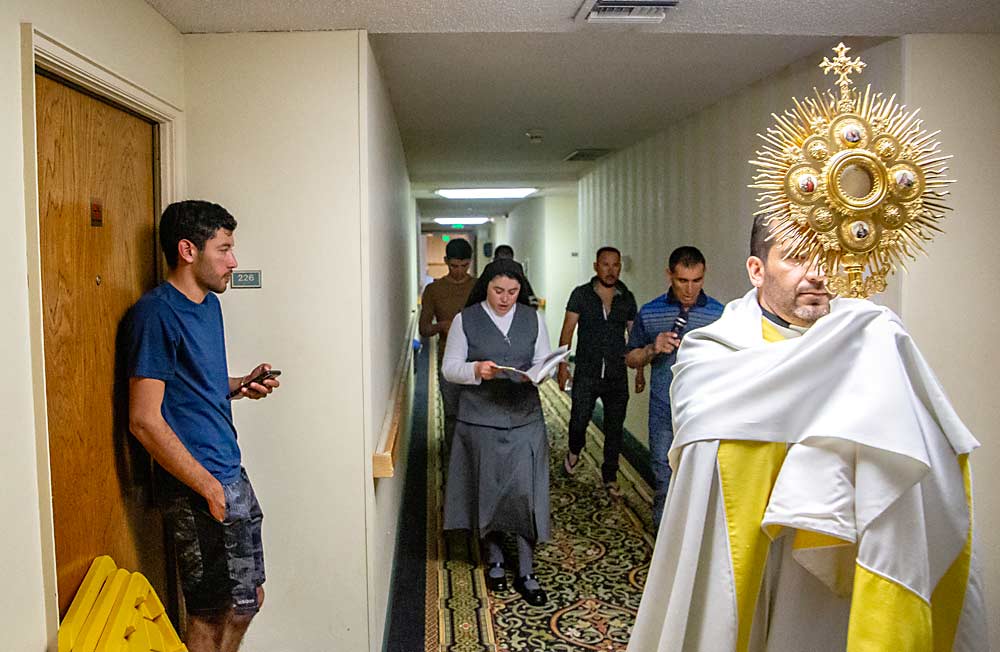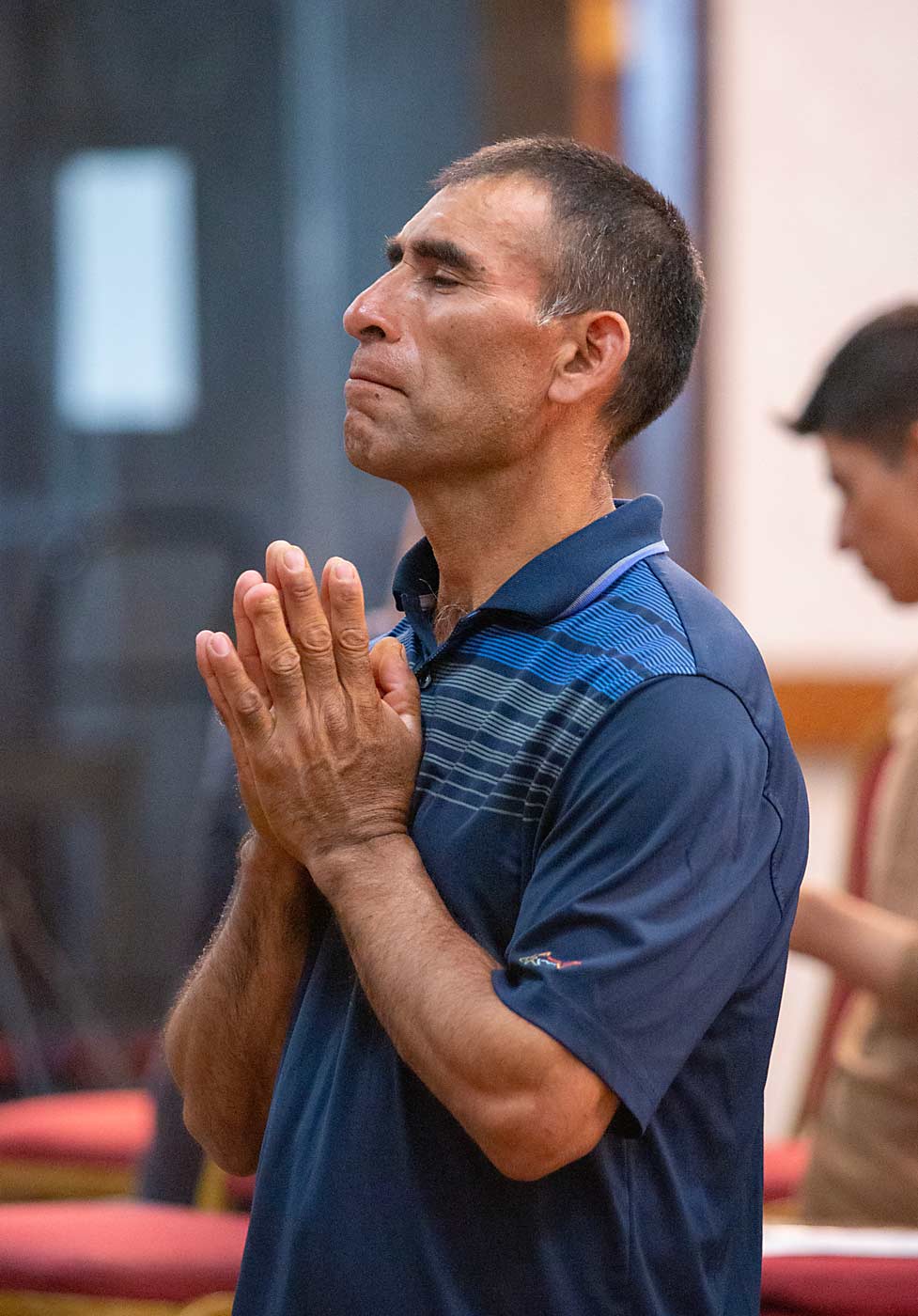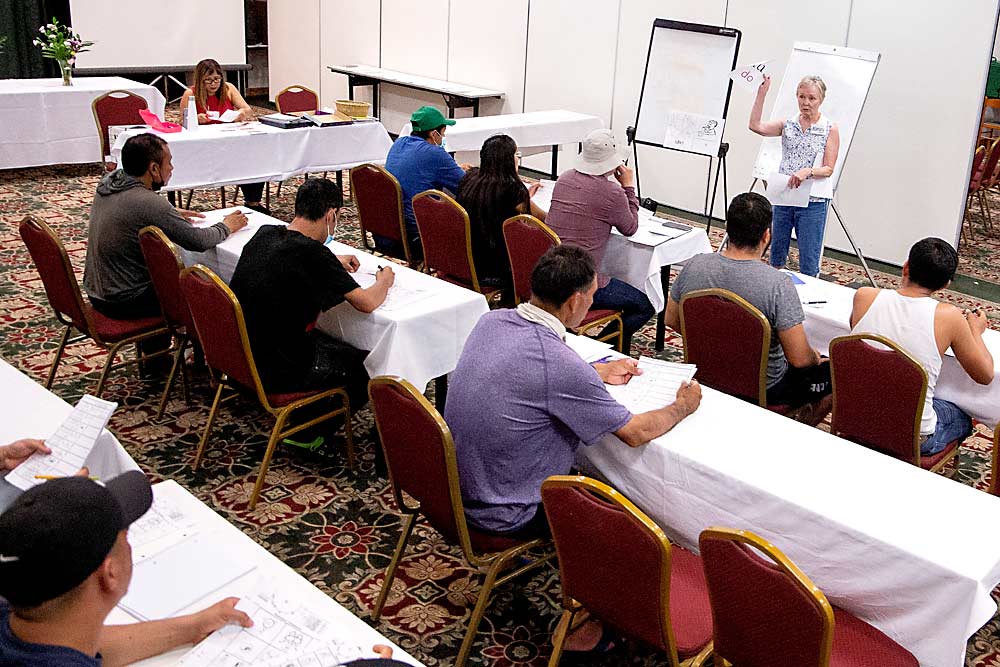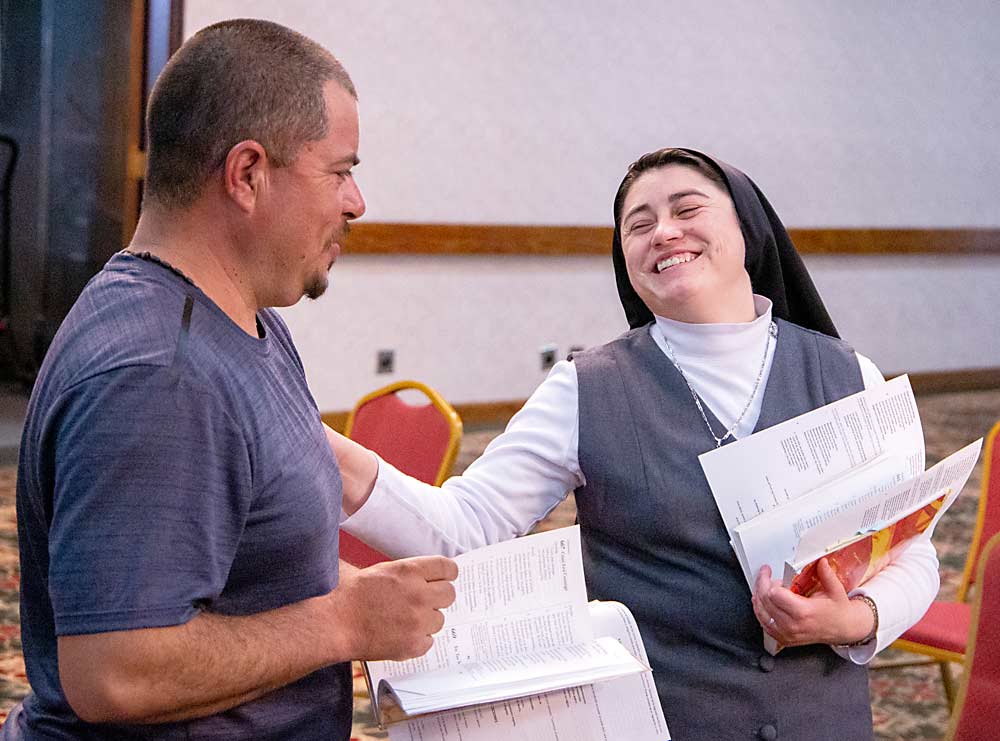
Microphone in hand and songs on his lips, Francisco Garcia marches through the hallways calling co-workers to worship, then drops to his knees in prayer in a Yakima, Washington, hotel conference room. His family, connected via livestream from Mexico, does likewise in a parish in their Oaxacan village of San Sebastian Rio Hondo.
When Garcia visits Yakima for his annual H-2A orchard labor stint, he tries not to miss church.
“Me siento en casa,” he said. I feel at home.
Even without workweeks shortened by overtime laws, guest workers have down time, clocking out mid-afternoon with hours to kill, hundreds of miles from families, churches and hobbies, for up to 10 months a year. Employers aren’t required to help them fill that time, but those who do coordinate activities — such as English classes, church services or soccer games — find it improves retention and morale and keeps workers out of trouble.

Activities at housing units
Some workers take initiative themselves, registering for online classes, for example. “A lot of the H-2A workers that come up are pretty aspirational and resourceful,” said Mike Gempler, executive director of the Washington Growers League, a Yakima-based farm employer nonprofit that operates seasonal farmworker housing.
Employers and agencies can — and often do — provide more, scheduling English classes, tax seminars and sports to make the hours between orchard shifts more interesting, comforting and fulfilling.
At the Growers League complex in Mattawa, manager Wendy Lopez calls them “empowerment activities.”
“I believe when you are more knowledgeable at something, you are empowered, you can go out there and do more, not only for yourself, but others,” she said.
Health clinics offer screenings, a Yakima nonprofit teaches about sexual harassment, and local police discuss behavior expectations. Mattawa’s mayor visits to thank workers for coming.
Lopez also steers workers to Mattawa community events, such as decorating cupcakes at a Christmas festival and shopping at a weekly flea market. Some workers have purchased local gym cards, and some join her on her walks through town.
Wafla, a Lacey, Washington, ag labor management nonprofit, offers similar opportunities at its housing facilities. The organization plans to introduce financial literacy to residents this year.
After-hours activities are more than just nice things to do, said wafla CEO Enrique Gastelum. Employers benefit by keeping guest workers out of trouble, motivating employees and demonstrating social responsibility for the farm, the fruit industry and the H-2A program overall.

With more than 30,000 H-2A workers expected in Washington this year, and 300,000 nationwide, some amount of legal trouble with drunk driving, fights and drugs is inevitable, he said.
“If workers end up being bored … they can quickly and easily get into trouble,” he said.
Company initiatives
FirstFruits Farms is well known for FirstFruits Community, a neighborhood at the sprawling, remote ranch near Prescott, in southeastern Washington. A chapel, gymnasium and store sit near the bunk houses. For decades, it has functioned like its own town.
In 2021, after years of working through an agency, the company began contracting H-2A workers directly and hired Gloria Alvarado as an H-2A coordinator. She has since been promoted to executive director of the community.
Last year, during the heat of June, she organized a volleyball tournament inside the air-conditioned gym. Many of the crews, which share housing, created their own teams with their own jerseys and names. Among them were Los Primos, or cousins; Chavarrucos, a Spanish colloquialism for old men pretending to be young; and Las Licuadoras, because one crew had an unfortunate habit of accidentally breaking blenders.
The company provided transportation for roughly 40 workers to attend church in Pasco, and this year it plans to invite ministers to hold services on-site. The community also partnered with groups to offer classes that led 17 workers to earn their GED diplomas and more than 60 employees through driver’s education.

At Alvarado’s previous company, she said workers were well treated, but there were no extra enrichment activities, something she thinks contributed to the turnover that company experienced. Some of the homesick men left in the middle of the season, without finishing their contracts.
“They’re not only workers,” she said. “They’re people that have families. They’re people that have a past, goals.”
Migrant Ministry
Existing community organizations already offer activities and want to plug in H-2A workers.
Take Migrant Ministry. Since 2012, the grant-funded program of the Catholic Diocese of Yakima has offered a range of amenities — worship services, tax filing workshops, health fairs and guitar lessons among them — in nine housing facilities throughout Central Washington, including the Fairbridge Inn, a Yakima hotel converted to a farmworker housing center.

“The human mind is powerful, but if we leave it without worthy activities, it will go dormant, hungry, angry, lonely, tired and frustrated,” said coordinator Father José De Jesús Mariscal Guzmán.
Usually, priests and seminarians spend about a month living in the facilities, to experience life the way workers do, getting up before dawn to hand out sack lunches and bid the laborers good day.
“By helping these men stay sane and out of trouble, by providing productive activities, we help their families, their communities and our neighboring country,” Mariscal Guzmán said. “We also try to give them an accurate impression of the great country that we live in.”
In August last year at Fairbridge, Juan Gomez was one of about 11 students in English class, taught by retired teacher Nancy Davis. The volunteer covered feminine, masculine and neutral pronouns, then question-and-answer phrases. “Does Elena study English? Elena does not study English.”

Gomez wants to navigate everyday life in America with more confidence, making sure he collects the correct amount of change at stores, for instance. “I want to be able to communicate in the streets,” he said in Spanish.
Garcia of Oaxaca relishes worship at Fairbridge for the chance to pray for his health, the health of his family and that of his co-workers. He usually helps plan the services. Not all of his housing facilities have offered worship services or rides to church.
Garcia also is one of the most eager participants in classes, such as money management and sexual health. He just loves to learn, he said.
“Some of these things we don’t have the opportunity to learn back home,” he said, also in Spanish. “A lot of these things they teach, we don’t know.”
—by Ross Courtney






Leave A Comment